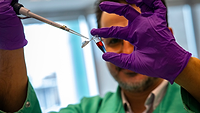Scientists Develop Antibody With Detection, Treatment Potential for Foodborne Campylobacter

Image credit: CDC via Unsplash
Researchers from Osaka Metropolitan University in Japan have developed an antibody that can identify Campylobacter jejuni and inhibit its growth. This antibody could be an important step toward preventing, diagnosing, and treating infections caused by the foodborne pathogen.
The monoclonal antibody is able to detect C. jejuni by reacting to QcrC, a multiprotein complex expressed in pathogenic Campylobacter. As QcrC was found by the researchers in multiple C. jejuni strains, the antibody’s reaction to the molecule is likely to be a highly reliable indicator of pathogenic C. jejuni. Additionally, because the antibody acts to suppress QcrC, which is involved in energy production for C. jejuni, the antibody has the potential to slow the bacteria’s growth and decrease its pathogenicity.
Not only could the antibody be useful in the development of a simple detection system for the rapid identification of C. jejuni contamination in food, it also has the potential to power medical treatments for C. jejuni infections, or could even provide the basis for a vaccine, according to the researchers.
Looking for a reprint of this article?
From high-res PDFs to custom plaques, order your copy today!









